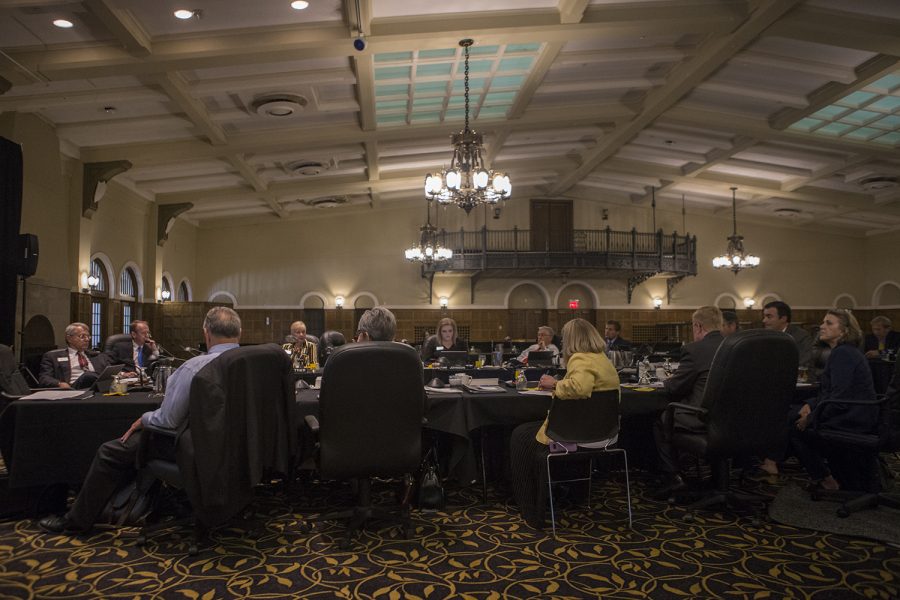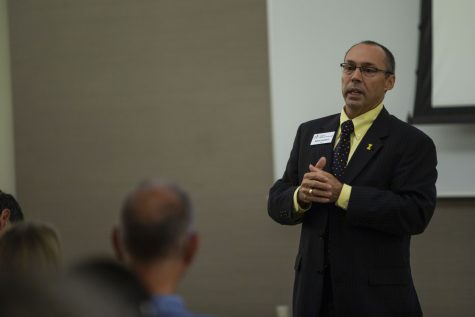Regents hear about evolving Student Disability Services
The Board of Regents listened to a presentation from each of its three universities that discussed the increasing number of students requiring disability services, and new numbers on retention and graduation rates in that regard.
Regents listen during the state Board of Regents meeting on Sept. 12, 2018 in the IMU Main Lounge.
September 18, 2019
The state Board of Regents on Sept. 18 in Council Bluffs heard from a representative of each regent university’s Student Disability Services discussing an overall increase in the number of students requiring accommodations, as well as new numbers in the retention rate of the population.
University of Iowa Director of Student Disability Services Mark Harris said the primary question he receives from parents of students with learning disabilities is whether their children can succeed on campus, based on the accommodations provided by his office.
“It’s nice to be able to show them the hard data now,” Harris said. “That will be a pretty good indicator of success.”
According to surveys of the students the office serves, Harris said, 93 percent of students with disability accommodations believe their instructors are capable of providing the accommodations.
He noted that the retention rate — from freshmen to sophomores, sophomores to juniors, and so on — of students needing disability services resemble retention rates of the students as a whole. The graduation rate of learning-accommodated students currently stands at 58 percent, he said, compared to 53.3 percent for all students.
“I think that speaks to the good work all of our offices are doing,” Harris said of not only the UI but his colleagues at the two other regent universities.
Director of Student Disability Resources at Iowa State University Steve Moats said the number of students each office works with is rising regularly. This is yet another indicator of good work, he said.
Nevertheless, this also provides the regents universities with challenges, as they aim to creatively meet the needs of each student. The largest populations the offices work with, Moats said, include students with learning disabilities, health disabilities, psychological and mental-health issues, and sensory and mobility disabilities.
RELATED: UI Office of Disability pilots three new programs for note-taking accommodations
“When we hear the word disability, generally, we think of a person in a wheelchair,” Moats said. “This information says very differently. It’s an exciting opportunity to work with a lot of our students, but our work is very complex because their needs are very complex.”
One of the fastest-growing groups of students in need of disability accommodations are those facing mental-health challenges and an increasing number of students on the autism spectrum, Moats said. The case-by-case need of each student requires the office to be very nimble, he said.
Kelly Fiddelke, the assistant dean of students for student accessibility services at the University of Northern Iowa, admitted that some accommodation requirements can cost up to $15,000 per year, but disability offices absorb the cost so as not to raise concern for students.
“We never want the student to feel as though, or even know, that money is even part of the equation with accommodations,” Fiddelke said.
RELATED: Students rally for disability awareness and inclusion on campus
Fiddelke emphasized that the effectiveness of disability services on college campuses is measured instantaneously, as the office strives to meet the needs of each student through collaboration with campus resources, peer institutions, and instructors.
At the UI, Harris said, much of his office’s time is spent focusing on first-year students on campus. Based on data that caseloads for staff members in that area averaged to 400 per person at regent universities in 2018, he said, the UI makes sure it is adequately staffed.
The UI Student Disability Services will also have an external review conducted in the next week, Harris said. Directors from three other institutions will examine the operation of the program and help make strategic decisions.
“We want to meet students where they’re at,” Moats said. “… Reasonable accommodations are something that [regents universities] have to provide if necessary.”
Kelsey Harrell contributed to this report.





















